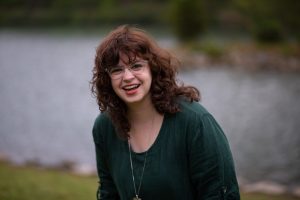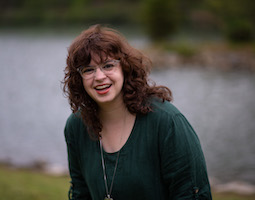Let’s Not Forget G!d
This week’s post is by Eliana Light, who is working towards a world of One-ness, guided and inspired by Jewish heritage.
While reading the introduction to Jewish Megatrends by Rabbi Sid Schwarz, my head was constantly  nodding in agreement. I am one of those “millennials” that Rabbi Sid is talking about, as are most of my friends. He suggested that Jewish institutions that were not serving the needs of Gen X, would do the same or worse with us, and he was right.
nodding in agreement. I am one of those “millennials” that Rabbi Sid is talking about, as are most of my friends. He suggested that Jewish institutions that were not serving the needs of Gen X, would do the same or worse with us, and he was right.
But what gave me hope were his four propositions because I see them animating Jewish innovation, from all parts of the political and religious spectrum. They also animate my own work, though I phrase it a bit differently. After thinking deeply about my work a few months ago, I rewrote the first line of my bio. It now reads, “Eliana Light envisions a joyful, vibrant, heart-centered Judaism that speaks to the soul and moves the spirit, reminding us that we all are One.” To me, this encapsulates all four propositions. Vibrancy comes from authenticity, teaching and living the wisdom of our heritage and bringing it to the world in new ways. Being heart-centered, open, and vulnerable is how we build true human connection. Addressing the big questions of soul and spirit and allowing ourselves to feel something beyond ourselves is holiness. And when we remind ourselves that we are One, we are moved to act towards justice in the world. While my work touches on all four of the propositions in Rabbi Sid’s essay, I’ll focus on spirituality and holiness, and mention something that the essay does not address specifically: G!D.
Rabbi Sid’s observation that Jews often do not know that spirituality can be found in a Jewish context is spot on. So often, our synagogues are places of rote recitation, lacking electricity or depth. It feels as if people are “praying”, but they don’t understand why. In fact, for many folks who do come regularly, it is not about prayer or meaning, but about community and comfort. These are important reasons and matter greatly, but if the synagogue is not your community and you don’t have nostalgia for the tunes, then you will find comfort and community elsewhere. Synagogues can no longer assume that Jews will come pray with them. The sparsely filled pews tell the story.
Communities must be clear about the purpose of prayer and craft their experiences accordingly. One of the reasons that start-up communities like Ikar, Romemu, and Lab/Shul are successful is because they were founded with a stated purpose. There is no tension between regulars and seekers. Those that come are “bought-in” to the prayer experience. In my work as a spirituality and prayer consultant for synagogues, I seek to help communities figure out what their purpose is, or multiple purposes are. Why pray? What can Jewish prayer and Jewish spiritual wisdom give to individuals, and to the world? We cannot convince people that prayer is compelling if we don’t believe it ourselves. This is not an easy task, but that’s why an outsider’s perspective is so valuable. Through observing services, listening to stories of congregants, meeting with leaders, and experimenting, communities are able to more confidently answer the question: Why pray? And why pray here?
Personally, I have found prayer meaningful on many different levels. Singing with others opens my heart and connects me to something larger. The words of the prayer connect me to the past, and the poetry speaks to my soul. If I thought that prayer was exclusively about asking a Sky-God for favors, I wouldn’t do it. Part of my work is sharing Jewish wisdom on prayer, offering perspectives on the “why.” When I lead a service, I write my own siddur with translations that are expansive and inclusive. I share G!D-language that emphasizes one-ness, that which unites us and inspires us to be our best selves. I choose tunes that are easy to sing, yet complex enough to keep our attention. These are skills that can be taught, not just to clergy, so they can incorporate them into their services, but to lay-people, so they have the tools to find meaning themselves.
God is a huge part of this process, larger than most people think. Our traditional liturgy reflects a theology that many of us no longer believe in- that of obedience, reward and punishment. That’s just not the world we live in. It can be painful to ask in prayer for someone’s healing and not have them be healed. It can feel mocking to say “God feeds the hungry” when we see so many people who are homeless and starving. But that’s only if we take the prayers at face value, and Judaism doesn’t take anything at face value only.
Through the music, programs, and curricular materials of the G!D Project, I help people unpack their “God baggage,” reflect on how they thought about God as kids and, if that has changed. I seek to move from God to G!D- exploding a limited word, making room for our own questions and challenges. The fact that G!D’s Name is not really “Adonai- Lord,” but really “Yud Hey Vav Hey- Being,” is something I did not know until a few years ago. An expansive G!D is foundational to Jewish life, as is wrestling with our ideas. Too often, the Dude-in-the-Sky stops making sense, but there is no alternative given. This, coupled with a lack of spirituality, is a huge reason why people leave Jewish practice and seek meaning elsewhere.
There is value in other religions and their practices. But all Jews deserve to know that there is a treasure in their own backyard and how to dig for it. Plus, I do think Jewish spirituality has ideas that are unique and matter: that G!D (meaning everything) is one and connected, and that this should lead us not just to connect individually, but to fight to make the world better. Judaism is both inward and outward-facing, and that’s too important to give up on.
Both of these issues- spirituality and G!D-language- matter and are connected. Only by providing and living a Judaism that is intellectually honest and spiritually rich can we thrive as a people. Only by giving people space to feel deeply, to wrestle with big questions, and to know they are not alone in those questions, can we give ourselves comfort in dark times and work towards a brighter future. I continue to do this work because I believe that this brighter future is possible, and I hope my work contributes to making it a reality.
[themify_hr color=”black” width=”100”]
Eliana Light envisions a joyful, vibrant, heart-centered Judaism that speaks to the soul and moves the spirit, reminding us that we all are One. She crafts ritual, writes music, trains educators, and consults with communities to bring this vision to life. (www.elianalight.com)


